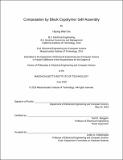Computation by block copolymer self-assembly
Author(s)
Do, Hyung Wan
DownloadFull printable version (7.093Mb)
Other Contributors
Massachusetts Institute of Technology. Department of Electrical Engineering and Computer Science.
Advisor
Karl K. Berggren.
Terms of use
Metadata
Show full item recordAbstract
Unconventional computation is a paradigm of computation that uses novel information tokens from natural systems to perform information processing. Using the complexity of physical systems, unconventional computing systems can efficiently solve problems that are difficult to solve classically. In this thesis, we use block copolymer self-assembly, a well-studied phenomenon in polymer science, to develop a new approach to computing by applying directed self-assembly to implement Ising-model-based computing systems in materials. In the first part of the thesis, we investigate directed self-assembly of block copolymer thin films within templates of different polygonal shapes. We define a two-state system based on the two degenerate alignment orientations of the ladder-shaped block copolymer structures formed inside square confinements, and study properties of the two-state system. In the second part of the thesis, we demonstrate an Ising lattice setup for directed self-assembly of block copolymers defined on two-dimensional arrays of posts. We develop an Ising-model-based simulation method that can perform block copolymer pattern prediction and template design. Finally, we design simple Boolean logic gates as a proof-of-concept demonstration of computation.
Description
Thesis: Ph. D., Massachusetts Institute of Technology, Department of Electrical Engineering and Computer Science, 2018. This electronic version was submitted by the student author. The certified thesis is available in the Institute Archives and Special Collections. Cataloged from student-submitted PDF version of thesis. Includes bibliographical references.
Date issued
2018Department
Massachusetts Institute of Technology. Department of Electrical Engineering and Computer SciencePublisher
Massachusetts Institute of Technology
Keywords
Electrical Engineering and Computer Science.